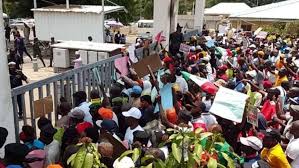
After Sallah, tomatoes, pepper prices remain high as North groans
Even though tomatoes and peppers are in season, their prices have skyrocketed in the North.
Residents claim their prices have stripped them to the absolute minimum due to the development, which has escalated to an alarming level.
A few days after the Muslim holiday of Eid-ul-Kabir, the majority of the inhabitants express their further dissatisfaction over the skyrocketing prices of pepper and tomatoes, in particular.
According to checks made by Arewa correspondents who went out to check on the situation in a few major northern markets, such as Kaduna, Gombe, Nasarawa, Kogi, Adamawa, Taraba, Benue, and Sokoto, the prices of these perishable goods are rising uncontrollably even after the celebration of Sallah, instead of decreasing.
For example, citizens of Lafiya, the capital of Nasarawa State, bemoaned the high price of tomatoes and peppers and urged the federal government to intervene to reverse the trend.
A housewife named Halima Musa informed our correspondent that a large basket of tomatoes that originally cost N17,000 now sells for N65,000, and a bag of pepper that once cost N10,000 now fetches N52,000.
She believes the government needs to step in quickly to control the situation by purposefully crashing the prices of goods on the market.
According to Joy Abraham, a mother of three and fellow housewife, she has stopped using fresh tomatoes or pepper in her cooking because the prices have continued to rise beyond her means.
Since the cost of fresh tomatoes hasn't decreased in the near future, I've made the decision to resume using sachet tomatoes.
"A small painter bucket of pepper, which sold for N600 now sells for N4,000, and a small painter bucket of tomatoes, which used to sell for between N1,000 and N1,500, now sell for N8,000 to N10,000,” she continued.
Yakubu Ibrahim, a tomato and pepper trader at the Lafiya market, cleared his colleagues of any responsibility for the commodities' skyrocketing prices.
"So many people are saying that it is our fault that the prices of tomatoes and pepper are increasing, but it is not so," he said, explaining in Hausa.
"We purchase the majority of these culinary ingredients from states in the North Central region, including Plateau State. And because we also take into account the suffering of our fellow citizens, we sell almost as much as we buy the goods," Ibrahim added.
Our correspondent in Lokoja, Kogi State, observed that a large basket of tomatoes sells for between N100,000 and N120,000, while a dustbin basket costs N11,000 there.
Ibrahim Yusuf, a vendor at the Kogi market, informed our correspondent at the old Lokoja market that the prices listed represented the most recent costs following the Sallah celebration.
Since I last made a purchase on Wednesday, three days ago, I'm positive the price will not be the same as at today,” he said.
A different vendor, Ilyasu Baba, claims that a full dustbin basket costs N3,500, while a full bag sells for N70,000 at the Kpata market in Lokoja. Baba sells onions.
He said that a bag of pepper costs between N8,000 and N12,000 at the Lokongoma market.
In the meantime, poor families in Adamawa State can no longer afford fresh tomatoes and peppers, and local restaurants and other restaurant owners are also complaining.
The rising costs of commodities continue to be the source of the moaning and gnashing of teeth.
When our correspondent went to the "Cooking-cooking Ingredient market" on the Jimeta-Girei Road, he or she saw that there were just vendors selling peppers and tomatoes and that no one was buying from them.
Several of the traders who were present said that the high price of the two commodities to the “unbearable high cost of transporting the commodities into the state.”
A trader who identified himself as Hassan Umar disclosed that a bag of fresh tomatoes now goes for ₦120, 000 and the big red pepper called ‘atarumbu’ now cost ₦55,000 per basket.
"₦500 is the cost of four tomatoes. "No tomatoes are available for purchase for even N300 anymore," he proclaimed.
Another trader, Abubakar Jimeta, informed our correspondent that obtaining tomatoes and fresh red pepper is a challenging undertaking. He blamed the development on the high cost of shipping the goods and the ongoing unrest that pervaded some Northern regions.
He emphasised, "In the past, we got our large quantity of supply from Benue State, but now, those that usually supply us the commodities have stopped due to the cost of transportation and the insecurity along the Wukari-Jalingo road."
Mrs. Grace Ishaya, the owner of a restaurant, claimed that the development compelled her to close her establishment because it puts tomatoes and fresh red peppers beyond her reach.
The story is the same in Jalingo, Taraba State, where locals bemoan the sudden spike in the price of tomatoes and peppers.
According to a survey our correspondent conducted a few weeks ago, the price of these necessities for soup was reasonably reasonable until recently, when it skyrocketed.
Once selling for N200, tomatoes now fetch about N500, and pepper has similarly increased in price from N150 to N400 per unit measure.
Hadjia Aisha Musa, a tomato vendor in the Jalingo market, consequently voiced her displeasure, claiming that the rise is out of reach for the merchants.
The price increase is not under our control. Due to poor weather and transportation problems, there is less available, which makes it harder for us to meet the demand. Customers are unhappy, and it’s affecting our sales,” she admitted.
Equally troubled by the growing costs are buyers; one customer, Mr. John Adamu, bemoaned the skyrocketing costs.
"It's getting increasingly difficult to afford the staples of our meals. The expense of tomatoes and peppers is making things difficult for my family financially.
Both shoppers and vendors of tomatoes in the Minna market claim that food prices are the highest they have ever been in Nigerian history, particularly for perishable goods like tomatoes and peppers.
The majority of consumers also bemoan the fact that they must now turn to unhealthy substitutes in order to flavour their food because the costs of the goods have risen beyond their means.
Toyin Alabi, a housewife, informed our correspondent that she no longer visits the Kure market to purchase food items, especially tomatoes and peppers because of the cost implication.
"There is nothing in the market that you can afford to buy with N20,000. Peppers and tomatoes are off limits now. What used to sell for between N250 and N300 for a small measure of tomato now fetches N1000.
"It gets worse with pepper. I used to buy enough pepper for the whole family for less than N500.00, but now that I have N1500, you have to say "I beg" to the sellers before they will listen to you," she insisted.
According to trader Abubakar Jibrin, traders are not solely to blame for the high price of the commodities, which are tomatoes and peppers.
Jibrin clarified that the traders had to go to locations outside the state, including Sokoto, Kano, and a few isolated villages within the states to purchase the items, which “is not easy.”
"I charge ₦20,000 for a basket of tomatoes, and depending on their size, I charge between N1000 and N1500 for a small measure. I assure customers all the time that it is not our fault. The most I would sell for in the past was N300, but prices are rising now as the economy keeps getting worse. Regretfully, prices are rising daily these days," he muttered.
A basket of tomatoes currently costs between N90,000 and N100,000 in Sokoto State.
Mallam Usman Aliyu, a trader who specialises in soup items known as Kayan Miya in Hausa, informed our correspondent that approximately two months prior, the identical item—tomatoes—sold for less than N30,000.
Two months ago, a basket containing the identical tomatoes you see here would have cost less than N30,000; however, did you know that it now costs over N90,000?
A pepper bag that was worth roughly N60,000 just a few days ago is now worth roughly N15,000.
"The general public's situation is out of control, and our government needs to step in to help."
When our correspondent went to the Tumfure and Baban Kasuwa markets in Gombe, she saw people complaining about how expensive tomatoes and peppers were.
Instead of using fresh tomatoes and pepper, a lot of residents now use dried ones.
"I can't afford it, not because I don't like fresh tomatoes and pepper." Doris Markus lamented the price of tomatoes at the market and said, "You can't compare dried tomatoes to fresh ones; the difference is clear."
Laraba Joshua added, "I use the dried tomatoes and pepper to make the pot of stew bigger, not because i don't know the difference." She also mentioned that she uses dried tomatoes to increase the quantity.
Pepper vendor Alhaji Abdu Bello bemoaned the price increase, pointing out that customers had been grumbling about the amounts.
Bello declared, "I'm not at all content. Clients are not content. It's not as though we are profiting greatly. Since then, the quantity we purchase in a single basket has tripled, and we must replenish it because people must eat.
As she got ready for her mother's funeral, Gladys Akpojiyovwi, a housewife, told the Sheikh





